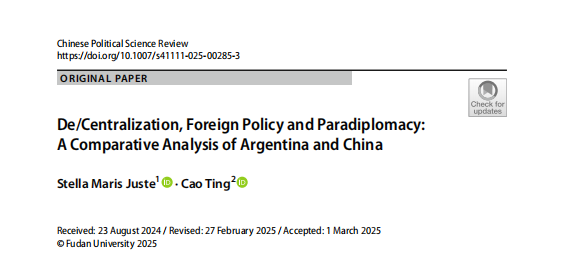作者:Stella Juste 曹廷 发布时间:2025-04-01 来源:Chinese Political Science Review+收藏本文

由复旦大学发展研究院访问学者、阿根廷国家科技委员会研究人员Stella Juste(第一作者)与复旦大学国际问题研究院拉美研究室副研究员曹廷(通讯作者)合作完成的论文“中央与地方分权、外交政策及次国家外交:阿根廷与中国的比较研究”发表于《Chinese Political Science Review》。中国政治科学评论(Chinese Political Science Review)是由复旦大学主办、Springer Nature出版的政治学学术刊物,2023年Cite Score分值为5.2,在政治学科类包括SSCI+ESCI的315本期刊在内的全部期刊中JCI排名Q1分区。
Abstract
阿根廷与中国在政治和行政体制上分别采用联邦制与单一制。在这两种体制下,各省通过次国家外交参与对外政策均具有重要意义。本文旨在分析阿根廷与中国在国家分权、外交政策及次国家外交之间的关联,重点探讨次国家层级与中央层级在次国家外交行动和外交政策制定中的互动机制。本文的理论框架结合单一制与联邦制政体治理结构,以及次国家外交与领土国际化研究,采用比较案例研究,聚焦2013-2023年阿根廷胡胡伊省与中国上海市的实践。这两个次国家单位在次国家外交中表现活跃,并在中阿合作中发挥实质性作用。基于上述事实,本文提出以下研究问题:中央与地方的权力分配如何影响国家与次国家单位的多层级协调?如何作用于国家外交政策与次国家外交的衔接机制?研究发现:国家结构的不同并不意味着分权形态的差异,次国家与中央层级间的功能性协调能形成包容各方发展利益的制度架构。在国际环境中,国家外交政策与次国家外交的协同,能够通过情境化策略实现符合国家发展利益的连贯行动。
Introduction
Argentina and China are organized politically and administratively as federal and unitary states respectively. In both cases, participation of the provinces in foreign policy through paradiplomacy is relevant. This article aims to analyze the relationship between decentralization/centralization of the state, foreign policy, and paradiplomacy in Argentina and China. In this context, the following research questions arise: How does de/centralization influence the multi-level articulation between the state and its subnational units? How does de/centralization affect the mechanisms of articulation between national foreign policy and subnational paradiplomacy? The intention is to analyze the articulation between the subnational and national levels in relation to paradiplomatic action and foreign policy-making.
Methods
The theoretical approach employs theories on decentralization and centralization in unitary and federal political systems; alongside studies on paradiplomacy and territorial internationalization. The methodology is a qualitative comparative case study in which the provinces of Jujuy (Argentina) and the city of Shanghai (China) are studied from 2013 to 2023.
Results
Whether a state follows a model of federal or unitary organization does not necessarily define the level of functional decentralization. Higher levels of decentralization are observed in China’s unitary system because its reforms gave Chinese provinces major responsibility for local management (in fields including the economy, education, health, and others). In contrast, despite adopting a decentralized system, functions in Argentina are largely centralized at the national level.
Conclusion
As a result, a state’s form of organization as a federal or unitary system does not necessarily respectively imply decentralization or centralization. Instead, greater or lesser functional articulation between subnational and national levels can promote a system which incorporates the development interests of all actors involved. In the international arena, the articulation between the state’s foreign policy and the paradiplomacy of subnational units enables coherent and concrete actions that take advantage of the opportunities of the context to further national development.
Key Words
De/centralization,Foreign policy,Paradiplomacy,Argentina,China
Link for Full Paper
https://link.springer.com/article/10.1007/s41111-025-00285-3
Authors
Stella Maris Juste
National Scientific and Technical Research Council (Consejo Nacional de Investigaciones
Científicas y Técnicas, CONICET) and National University of Jujuy, Argentina
Cao Ting(Corresponding author)
Research Office for Latin American Studies, Fudan University